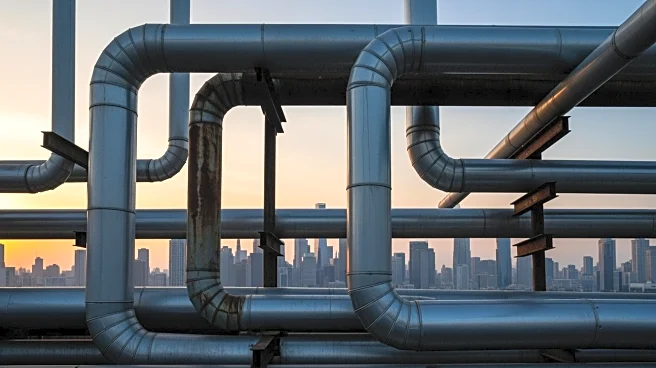What's Happening?
Peoples Gas, the primary energy supplier in Chicago, has initiated a Pipe Replacement Program (PRP) aimed at replacing old and dangerous pipes throughout the city. While the program is intended to improve safety, it has sparked criticism due to its reliance
on fossil fuel infrastructure, which could lock Chicago into a long-term commitment to these energy sources for the next 50 to 60 years. Additionally, the program has led to increased gas bills for residents, raising concerns about affordability and sustainability. Critics argue that the PRP is flawed and advocate for alternative solutions such as pipe lining and targeted electrification to transition towards cleaner energy systems.
Why It's Important?
The PRP's reliance on fossil fuels poses significant environmental concerns, as it may hinder efforts to transition to cleaner energy sources. The increased cost of gas bills could disproportionately affect low-income residents, exacerbating economic disparities in Chicago. The program's long-term commitment to fossil fuel infrastructure could impede the city's ability to adopt more sustainable energy solutions, impacting public policy and environmental goals. Pressure is mounting on the Illinois Commerce Commission to reconsider investment strategies and prioritize cleaner energy systems to ensure a sustainable future for Chicago.
What's Next?
Advocates for cleaner energy are urging the Illinois Commerce Commission to explore alternative solutions that address safety concerns while promoting sustainability. Potential next steps include lobbying for investment in pipe lining and electrification projects that could reduce reliance on fossil fuels. The outcome of these efforts could influence future energy policies and impact the affordability of energy for Chicago residents. Stakeholders, including environmental groups and local government officials, are expected to play a crucial role in shaping the direction of energy infrastructure development in the city.
Beyond the Headlines
The debate over the PRP highlights broader issues of energy policy and environmental justice in urban areas. The reliance on fossil fuels raises ethical questions about the responsibility of energy suppliers to prioritize sustainable practices. The increased financial burden on residents underscores the need for equitable energy solutions that do not disproportionately impact vulnerable communities. Long-term shifts in energy policy could set precedents for other cities facing similar challenges, influencing national discussions on energy sustainability and climate change.
















